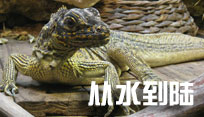蝾螈壶菌:威胁蝾螈的致命真菌
Batrachochytrium salamandrivorans: Deadly fungal threat to salamanders
作者:若冷清然
Batrachochytrium salamandrivorans(
Bsal)蝾螈壶菌,一种致使蝾螈患上壶菌病的真菌病原体,其在荷兰引起火蝾螈的群体性死亡而令整个两栖动物保护圈震惊,随后该真菌散布到比利时及德国。Martel 等2013年9月对此进行了第一次报道,
Bsal跟
Batrachochytrium dendrobatidis (
Bd)很类似。Bsal用水生的孢子来感染动物的皮肤,从而导致其皮肤损伤、厌食、运动失调直至死亡。Martel等假设
Bsal起源于亚洲,通过国际宠物贸易传播到了荷兰(Martel et al 2014)。基于野外调查和室内实验,Martel假设至少有3种寄主:中国的蓝尾蝾螈
Cynops cyanurus(图1),日本的红腹蝾螈
Cynops pyrrhogaster(图2)以及越南的德氏瘰螈
Paramesotriton deloustali(图3)。在他们的研究当中,Martel评估了来自蝾螈科和无肺螈科的5科24种物种,发现蝾螈科的物种特别容易受这种疾病的影响。

图1.蓝尾蝾螈
Cynops cyanurus, photo by Todd Pierson

图2.红腹蝾螈
Cynops pyrrhogaster, photo by Mark Aartse-Tuyn

图3.德氏瘰螈
Paramesotriton deloustali, photo by Henk Wallays
威胁等级
Bsal目前在亚洲的野外环境中还没有记录,然而,自从在荷兰、比利时或德国被发现以后,鲜少的研究已经指出它的全球性威胁(Bales et al. 2015; Muletz et al. 2014)。我们所知道的是,在被测试的24种蝾螈中,Bsal能致死至少12种,包括粗皮蝾螈
Taricha granulosa?(图4)和火焰蝾螈
Notophthalmus viridescens (图5;蝾螈科) (Martel et al. 2014)。这两种物种都广泛分布于蝾螈的生物多样性热点区域,它们在当地高密度分布,且具有重要的生态系统功能。

图4.粗皮蝾螈
Taricha granulosa, photo by Aaron Schusteff

图5.火焰蝾螈
Notophthalmus viridescens, photo by Henk Wallays
在过去的5年里(2010-2014),99%美国蝾螈不是起源就是通过亚洲进口,且91%的物种都是来自于蝾螈属
Cynops或是瘰螈属
Paramesotriton (Yap et al. 2015),包括先前提及的物种(Martel et al 2014)。
Yap等预测北美,这个在具有世界上50%蝾螈物种的蝾螈生物多样性热点区域,将易遭受
Bsal的侵袭。基于
Bsal潜在的适宜栖息地、物种丰富度、物种特有性以及潜在的进入港口,他们认定美国东南部(阿巴拉契亚山脉的南部范围和相邻的东南地区),美国西部(太平洋西北地区和内华达山脉)以及墨西哥高原中部(马德雷山脉的部分地区和跨墨西哥火山带)为更易遭受威胁的地区(图6和图7)。

图6.蝾螈壶菌在北美的易受威胁情况
Bsal Vulnerability Model for North America (Yap et al. 2015)

图7.美国蝾螈进口情况统计(来自Yap et al. 2015)
保护行动
基于已经了解的超过十年的
Bd爆发和研究(Wake and Vredenburg 2008; Stuart et al. 2004; Skerratt et al. 2007)分析,Bsal侵入北美野外种群的影响将是严重且不可逆转的。从已经给出的这些易受威胁的模型来看,
Bsal入侵的危险是非常高的。一些保护组织和科学家已经写信到美国鱼类和野生动物执行机构(USFWS),促使他们紧急终止所有进口到美国的活体蝾螈贸易。在2015年的5月14日,生物多样性和拯救蛙类中心(the Center for Biological Diversity and Save the Frogs!)提交了一个正式的终止请愿书。然后USFWS说他们将在雷斯法案的条例下尽快促使这项工作的完成,但截止于2015年7月,这个问题都没有解决。
详见:Tiffany Yap & Michelle Koo ? ??http://amphibiaweb.org/chytrid/Bsal.html
参考文献:
Bales, E. K., Hyman, O. J., Loudon, A. H., Harris, R. N., Lipps, G., Chapman, E., Roblee, K., Kleopfer, J.D., and Terrell, K. A. (2015). Pathogenic Chytrid Fungus Batrachochytrium dendrobatidis, but Not B. salamandrivorans, Detected on Eastern Hellbenders. PLOS ONE, 10(2), e0116405.
Martel, A., M. Blooi, C. Adriaensen, P. Van Rooij, W. Beukema, M. C. Fisher, R. A. Farrer, B. R. Schmidt, U. Tobler, K. Goka, K. R. Lips, C. Muletz, K. R. Zamudio, J. Bosch, S. L?tters, E. Wombwell, T. W. J. Garner, A. A. Cunningham, A. Spitzen-van der Sluijs, S. Salvidio, R. Ducatelle, K. Nishikawa, T. T. Nguyen, J. E. Kolby, I. Van Bocxlaer, F. Bossuyt, and F. Pasmans. (2014). Recent introduction of a chytrid fungus endangers Western Palearctic salamanders.Science, 346(6209), 630–631.
Martel, A., Ppitzen-van der Slulis, A., Blooi, M., Bert, W., Ducatelle, R., Fisher, M.C., Woeltjes, A., Bosman, W., Chiers, K., Bossuyt, F., and Pasmans, F. (2013). Batrachochytrium salamandrivorans sp. nov. causes chytridiomicosis in amphibians. Proceedings of the National Academy of Sciences of the United States of America, 110(38), 15325–15329.
Muletz, C., Caruso, N. M., Fleischer, R. C., McDiarmid, R. W., and Lips, K. R. (2014). Unexpected rarity of the pathogen Batrachochytrium dendrobatidis in Appalachian Plethodon salamanders: 1957-2011. PLoS ONE, 9(8), 1–7.
Skerratt, L. F., Berger, L., Speare, R., Cashins, S., McDonald, K. R., Phillott, A. D., Hines, H. B., and Kenyon, N. 2007. Spread of chytridiomycosis has caused the rapid global decline and extinction of frogs. EcoHealth 4: 125-134.
Stuart, S., Chanson, J. S., Cox, N. A., Young, B. E., Rodrigues, A. S. L., Fishman, D. L. and Waller, R. W. (2004) Status and trends of amphibian declines and extinctions worldwide. Science 306: 1783-1786.
Wake DB, and Vredenburg VT (2008) Are we in the midst of the sixth mass extinction? A view from the world amphibians. Proceedings of the National Academy of Sciences 105:11466-11473.
Yap, T.A., Koo, M.S., Ambrose, R.F., Wake, D.B., Vredenburg, V.T. (2015) Averting a North American biodiversity crisis. Science 349(6347):481-482 doi:10.1126/science.aab1052 Paywall getting in the way of access? Download here for free access (Pub #51).












